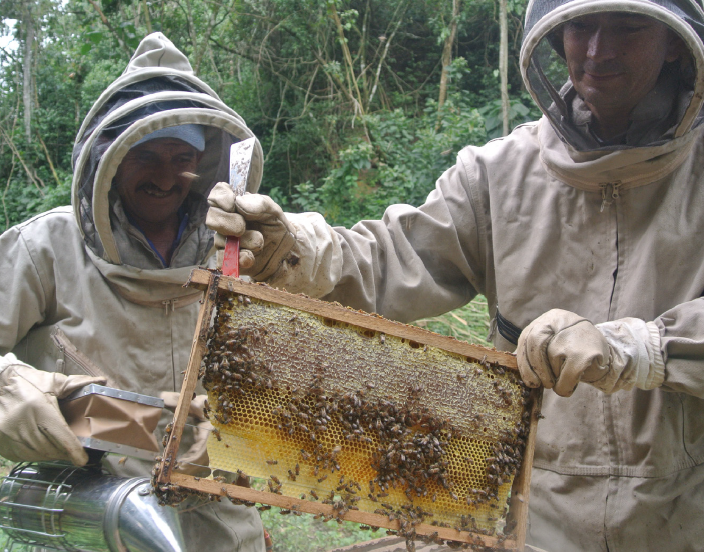
A public-private partnership in the honey value chain, facilitated by USAID, stimulates public investment in Cesar’s rural development.
For Oswaldo Ramos Chaparro, beekeeping is a legacy passed down the generations from his ancestors, who used honey mainly for medicinal purposes. Now Oswaldo—a young indigenous Arhuaco leader in the department of Cesar—wishes to share his beekeeping knowledge with others in order to preserve the tradition and turn it into a productive commercial activity for his community.
Over the last twenty years, Oswaldo and his community have endured droughts, robberies, and poisoned bees. They struggled to maintain the tradition when the community came to this part of the Sierra de Santa Marta mountain range. The land, more arid and used for cattle, does not seem ideal for beekeeping.
The hardest years were 2000–2005, when the community was forced to move further up the mountains after being threatened by the armed actors of Colombia’s drawn out conflict. These groups took away the community’s freedom to move throughout the territory and even placed them at risk of starvation.
“We had to leave our farms, leave everything in order to stay alive and maintain a balance with mother nature. For a long time, our leaders have focused on spiritual healing to mitigate those impacts,” explains Oswaldo.
The community has since found peace in the village of Jimain, located on near Pueblo Bello (Cesar), where Arhuaco beekeepers started again from scratch. Oswaldo and the community’s spiritual leaders have spent hours and days meditating on the floral diversity in the forest to provide for the bees, an essential part of their goal to preserve a healthy balance with their natural surroundings.
A Beekeeping Revival
In 2016, the Arhuaco community obtained 100 new hives as participants in a public-private partnership (PPP) facilitated by USAID’s Land and Rural Development Program. The PPP—largely funded by Cesar’s Secretariat of Agriculture and the Ministry of Agriculture—benefits 80 beekeepers from three producer associations from the municipalities of Manaure and Pueblo Bello, and four commercial partners. The PPP is valued at US$5.3 million, and 93 percent of its funding comes from public sources.
In the context of improving livelihoods for rural citizens, the partnership represents a positive step in the departmental government’s strategy to link land use in protected areas—where extensive cattle ranching and large-scale agriculture are prohibited—to the needs of local residents.
“As an indigenous population, we are often forgotten, and it can be hard to access programs sponsored by the municipal and departmental governments. This project gives us a chance to access those programs and bring a message back to the community. It feels like we have a brother standing by our side.
— Oswaldo Ramos Chaparro, Arhuaco beekeeper
Under the partnership, the government of Cesar delivered 500 hives, beekeeping equipment and honey processing material to 80 beekeepers, including 15 families from the Arhuaco community. The government then leveraged this support and created the region’s first beekeeping school, which provides technical assistance to beekeepers on genetic improvements, queen bee management, floral timetables, honey extraction, and production best practices.
“Before, we would squeeze the honeycombs with our hands. We don’t do that anymore, which is more hygienic and allows to reuse the combs,” says Witman Martínez, a beneficiary of the PPP from Manaure, who has eight years of experience as a beekeeper and continued to improve his knowledge through the beekeeping school.
With the better techniques and processing, each producer is expected to increase production from 10 kg to 30 kg per hive each year and sell 70% of their supply to commercial partners.
Each One, Teach One
In November, Oswaldo, Witman and the rest of the first round of the partnership’s beekeepers graduated. Next step: teaching. A handful of the most successful beekeepers were selected and will deliver practical training to 100 new beekeepers from their municipalities. During the next three years, the PPP aims to train 500 beekeepers and secure 15,000 extra hives for residents in municipalities with beekeeping activities.
“We’re carrying out an agricultural and rural development policy with a vision towards the future. Beekeeping has served as a concrete example for applying the same methodology to other value chains, like mango. And thanks to USAID, each one benefits from increase effectiveness and efficiency from our part. We are able to better attend to requests, not just in terms of response times but also in terms of quality,” explains Carlos Campo Soto, Cesar’s secretary of agriculture.
“With this support, we know where we’re going. The beekeeping school taught us to look at beekeeping with a broader view, one that looks at the commercial aspects as well. We feel like we’re not alone,” Gunabia says.

